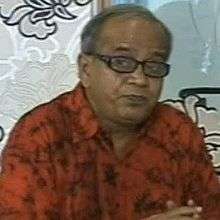Amar Mitra (writer)
| Amar Mitra অমর মিত্র | |
|---|---|
 | |
| Born |
August 30, 1951 Satkhira, Khulna, Bangladesh |
| Residence | Kolkata, West Bengal, India |
| Nationality | Indian |
| Citizenship | Indian |
| Occupation | Civil Service |
| Known for | Sahitya Akademi Awardee Bengali Writer |
| Spouse(s) | Mitali Mitra |
| Children | Chakori Mitra(daughter) Rajosik Mitra (son) |
| Awards |
Sahitya Akademi 2006 |
Amar Mitra (Bengali: অমর মিত্র (born 30 August 1951) is an eminent writer in Bengali living in Kolkata, West Bengal, India. A student of Chemistry,[1] he has been working for the Land Reforms Department of The Government of West Bengal. He was awarded with Sahitya Akademi Award for his novel Dhurbaputra (Bengali: ধ্রুবপুত্র) in 2006.[2] He has also received the Bankim Puraskar from Government of West Bengal for his novel, Aswacharit(Bengali: অশ্বচরিত) in 2001[3] and edits the new generation Bengali Webzine Bookpocket.net [4]
Major works
Amar Mitra started writing very early in his youth and his first short collection was published in 1978. By now, he has authored 30 novels, 4 books for children and 10 collections of short stories.
Amar Mitra writes in Bengali but is truly Global in spirit. He is deeply committed to understanding the common people, their hopes and aspirations, their struggle for a meaningful, joyful existence. An urbanite by virtue of his long stay in a metropolis, Amar Mitra is at the same time deeply rural- as most in this country are. His job has taken him to remote corners of rural and tribal West Bengal and he has come back enriched each time with a new vision. What has been captured in his writings is much more than the varied and dynamic socio-political fabric of the rural Bengal.
The range and variety of his novels are far reaching and diverse to say the least. In Dhurbaputra (son of Dhruba) he has depicted the ancient city of Ujjain from two thousand years before. The people of Ujjain were facing a long persisted drought, rainless in the city of Meghdutam, an immortal creation of poet Kalidas . Nisharger Shokgatha ( Mourning Ballad by the Nature ) is an insight into the devastating Latur( Maharashtra ) earthquakes and life emerging out of debris. In Aswacharit, he deals with Magic Realism. Siddhartha, the Prince of Kapilabastu, later known as Buddha., left behind his kingdom, mundane glory and wealth and chose the steep path of sacrifice; the long and lonely way to salvation. Kanthak, the Prince's Horse and Chhandak, the charioteer , were both left deserted. The Horse disappeared on one full-moon night of Boishakh, the day Lord Buddha Buddha was born from the seaside of south-Bengal, his shelter at the end of 20th century. Then the perennial search of the charioteer for the Horse began.
The historical legend is symbolically explored in Aswacharit( Chronicle of the Horse ). In this magical work of art- past and present ; ancient and modern times ; age-old History and stark reality are contritely juxtaposed. The charioteer, in his constant and confusing search,traverses a long way; – from the legendary shipyard of ancient time to the rocket launching ground of the 21st century. Aswa, the Horse,on the other hand, is being followed by a killer who is in ambush. In self- defence, the Horse also runs through the whole of the country; villages, the deserts, the entire human-abode which is shown as overshadowed and endangered by radio-active rays due to consecutive atomic experiments in the desert of Thar, Rajasthan at the day of Buddhapurnima, birth day of Buddha.
Through this superbly written modern classic, the writer sends a message to his readers that humanity itself is endangered by lust of power, indiscriminate violence and killings of war. Set firmly in the past; yet with a wary eye on the present.